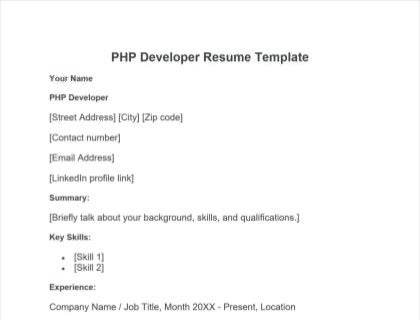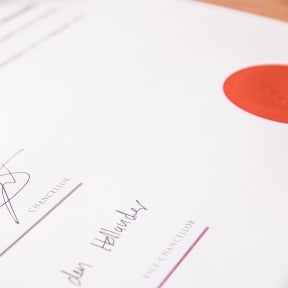
PHP Developer Resume Free Template Download:
Download our generic PHP developer resume in MS Word format.
Download NowPHP Developer Resume Example:
Your Name
PHP Developer
[Street address]
[City]
[Zip code]
[Contact number]
[Email address]
[LinkedIn profile / website]
Summary:
[Briefly talk about your background, skills, and qualifications.]
Key Skills:
- [Skill 1]
- [Skill 2]
Experience:
Company Name / Job Title, Month 20XX - Present, Location
Company Name / Job Title, Month 20XX - Month 20XX, Location
Company Name / Job Title, Month 20XX - Month 20XX, Location
Education:
School Name / Degree, Month 20XX - Month 20XX, Location
School Name / Degree, Month 20XX - Month 20XX, Location
Certifications:
- [Certification 1]
- [Certification 2]
Career Achievements:
- [Achievement 1]
- [Achievement 2]
- [Award 1]
- [Job promotion 1]
How to Write a PHP Developer Resume:

A step-by-step guide to writing the perfect PHP developer resume.
Start with a summary.
Make your summary stand out.

You'll want your summary to create a great first impression, intriguing employers enough to continue reading your resume. Start by showcasing your most desirable qualities including your skills, years of experience, and top accomplishments.
Keep your summary short and to the point.

Aim to keep your summary under four sentences and only include the most pertinent information. Add a sentence about how your specific skill set and experience will benefit the employer's organization.
Outline your technical skills.
Start with your most important skills.

Your core PHP developer skills, such as object-oriented PHP programming, understanding of MVC designs, and working knowledge of front-end technologies including HTML5, JavaScript, and CSS3, should be mentioned first.
Be sure to mention all relevant skills that could set you apart from other candidates.
Match your skill set with the job posting.

You'll want to list all relevant skills and competencies you have acquired over time. Directly match your skills with the job requirements. Do not list skills that will not be needed for the position.
Be truthful.

When listing your skills, remain honest about your level of expertise as the recruitment process may require practical assessments.
Mention your experience.
Add your experience in reverse chronological order.

The work experience section is an imperative part of your resume as employers will want to read about the PHP projects and tasks you've completed at previous positions. You'll want to start this section with your most recent position.
Add the places you have worked.

Include the name of each company, your role, how long you worked there, and where the company is situated. Use bullet points to list the tasks and responsibilities for each position.
Be sure to pay special attention to the type of responsibilities you managed at previous jobs. This will help employers envision you in the role and determine the type of tasks you're knowledgeable in.
Add your education information.
List your qualifications.

Add your qualifications in reverse chronological order, each with an institution name, the dates of attendance, and a location.
Mention qualifications in progress.

If you're studying towards a qualification, indicate it at the start of this section. Omit the initial date and instead include the words "In Progress."
Highlight your certifications.
List any relevant certificates.

While your portfolio of projects already says a lot about you and your abilities, to help improve your chances of an interview, consider adding relevant certifications, even if not required.
Start with your most relevant certificate.

If you obtained more than one certificate, consider which one employers would be most interested in and mention it first.
Common certificates related to PHP developers include:
- Zend Certified Engineer (ZCE).
- MySQL 5.0 developer I.
- Linux LPI 102.
- Microsoft Technology Associate (MTA).
Add certification details.

Be sure to mention the institution and the date you obtained your certification. Certificates awarded by accredited institutions indicate to employers that you have formal training and that you're passionate about your job.
List your career achievements.
Showcase any major completed projects.

Your career milestones are a great addition to your resume because they act as solid references, proving to employers that you're more than capable of exceeding their expectations.
These could include, for example, that you were the lead developer of enterprise-grade PHP code to scale beyond 25,000 ticket transactions per minute, or that you designed a claims submission app for a popular insurance company, etc.
List key career moments at the end of your resume.

These typically include achievements such as promotions and awards that may be of particular interest to employers. Remember that each entry should also identify the institution/employer and don't neglect to provide a date.


